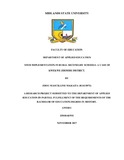Please use this identifier to cite or link to this item:
https://cris.library.msu.ac.zw//handle/11408/3067| Title: | STEM implementation in rural secondary schools: a case of Kwekwe Zhombe district. | Authors: | Zhou, Mascilline Makaita | Keywords: | Education STEM implementation Rural schools |
Issue Date: | 2017 | Publisher: | Midlands State University | Abstract: | The main objective of the study was to discuss and assess STEM implementation in rural secondary schools. The study mainly focused on two rural schools in Zhombe, Kwekwe District in the Midlands province. The schools are Siyaphambili Gwenzimkulu secondary school and St Faith Manzimnyama secondary school. The study sample comprised of ten teachers (five from each school) selected using purposive sampling and seventy students (thirty-five from each school) that were selected using the random sampling technique. In the collection of data the researcher used structured questionnaires, interviews and observations. The data collected was analysed using pie charts, graphs and tables. In the study the researcher found out that financial constraints burden both the staff and the SDC in planning on the activities to carry on the schools thus ending up developing infrastructure. Poverty was found to be dragging development of students as most of parents cannot even afford to the fees of their pupils thus also retarding development at school and community level. In the study poor technology and teacher training facilities were also found to be affecting STEM implementation in these rural areas. The study noted that the student’s background, perception and socio-cultural values do affect the way pupils think and behave at school thus ending up having negative attitude towards STEM subjects. Demographic changes, lack of hands-on training for students, power shortages and lack of research collaboration across STEM fields were some of the challenges note to be affecting STEM progress. The researcher suggested solutions such as giving teachers in rural areas incentives acting as compensation for them as they live and are exposed to such harsh rural environments. There should also be training programmes and workshops for both teachers and pupils. The government should also engage in more payments of fees to STEM children. | URI: | http://hdl.handle.net/11408/3067 |
| Appears in Collections: | Bachelor Of Education Honours Degree In History |
Files in This Item:
| File | Description | Size | Format | |
|---|---|---|---|---|
| makaita zhou.pdf | Full Text | 746.96 kB | Adobe PDF |  View/Open |
Page view(s)
176
checked on Apr 29, 2025
Download(s)
92
checked on Apr 29, 2025
Google ScholarTM
Check
Items in MSUIR are protected by copyright, with all rights reserved, unless otherwise indicated.



